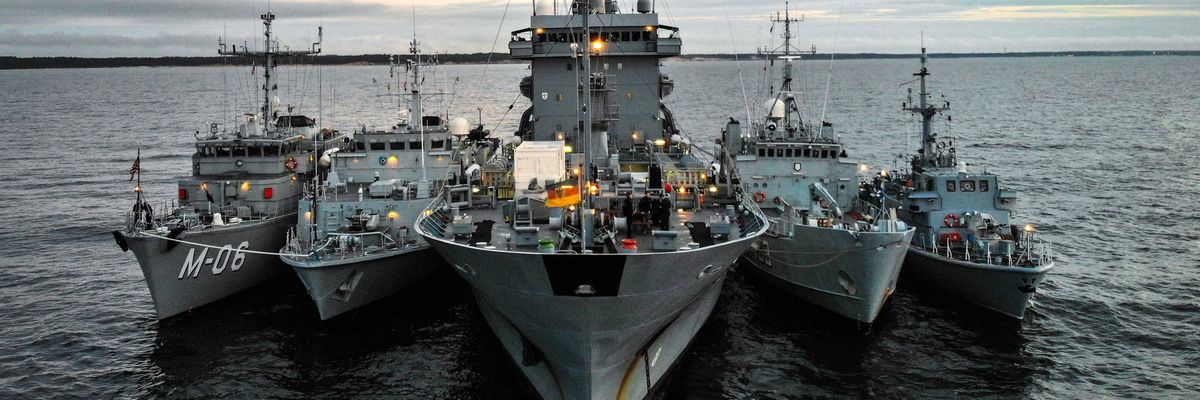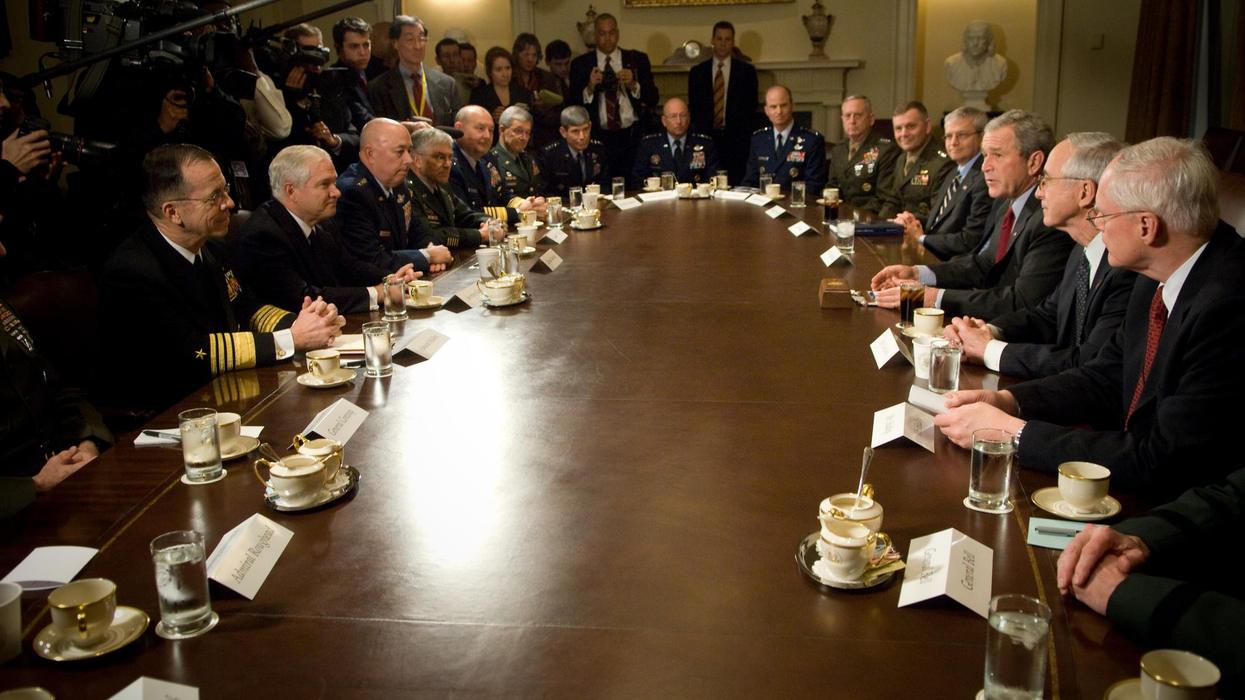Russia and Ukraine are at war, Europe’s failure to take its defense seriously is evident to all, and the allies finally feel pressure to spend and do more militarily. Why, then, did they treat China as an adversary and invite several Asia-Pacific governments to last week’s NATO summit?
Three years ago Emmanuel Macron described the transatlantic alliance as brain dead. Europe’s response to Russia’s invasion of Ukraine proved his point. The European continent has ten times the economic strength and more than three times the population of Russia. Yet European governments were strikingly ill-prepared for Moscow’s attack.
Although unjustified, Vladimir Putin’s “special military operation” should have come as no surprise. NATO ostentatiously flouted Russia’s oft-stated security concerns and violated a gaggle of allied assurances by extending the alliance ever eastward. Then its members refused to negotiate over Putin’s demand that they go no further. No one believed he would follow up with a broad invasion of Ukraine. When he did, the Europeans engaged in much wailing and gnashing of teeth while turning to Washington.
Successive U.S. administrations asked, pushed, demanded, and begged the Europeans to do more for their own defense, but undercut that message by sending “reassurance” missions and establishing “reassurance” programs to convince NATO members that America would always be there, no matter how little they did. Washington also backed admission of military midgets of no practical security value, such as Montenegro and North Macedonia. Had the Duchy of Grand Fenwick applied, it would have been added as well.
After Russia’s invasion, Gen. Mark Milley, Chairman of the Joint Chiefs of Staff, proposed establishing permanent bases in Eastern Europe (additional forces, weapons, and a headquarters in Poland were announced by Biden during the NATO summit). In Madrid the Pentagon announced multiple new deployments on the continent. Moreover, the Defense Department said it “continues to execute $3.8 billion in European Deterrence Initiative funding (with another $4.2 billion requested in FY23) for rotational forces, exercises, infrastructure (construction of storage facilities, airfield upgrades, and training complexes) and prepositioned equipment.”
Despite President Donald Trump’s ostentatious diatribes during his own tensure, European military efforts still lag badly. According to the latest figures, only one alliance member spent a greater share of its GDP on the military than did Washington — Greece, which is more concerned about fellow NATO member Turkey than Russia. Just seven other European governments met the two percent guideline, which was agreed to 16 years ago. Anyway, given the ferocity of combat in Ukraine, a couple pennies on the dollar seems inadequate for countries, such as Poland and the Baltic States, which claim to fear a Russian Armageddon and constantly lobby for their own US garrisons.
Even the United Kingdom, despite taking a lead hardline role against Moscow, “has refused to increase defense spending this year, as ministers and the head of the army plead for more money to deal with the Russian threat.” This despite “warnings from Ben Wallace, the defense secretary, that the armed forces were surviving on a ‘diet of smoke and mirrors.”
So what does NATO plan on doing in the Asia-Pacific? If European alliance members still are not serious about their defense from Moscow, they aren’t likely to confront an even more formidable power thousands of miles away, one with which many of them have significant economic ties.
They do know the talk, however. The NATO 2022 Strategic Concept released in Madrid devoted two paragraphs to China. The first complained that the PRC’s “stated ambitions and coercive policies challenge our interests, security and values.” China was accused of conducting “malicious hybrid and cyber operations,” seeking “to control key technological and industrial sectors, critical infrastructure, and strategic materials and supply chains, using “its economic leverage to create strategic dependencies and enhance its influence,” and subverting “the rules-based international order, including in the space, cyber and maritime domains.”
Moreover, “the deepening strategic partnership between the People’s Republic of China and the Russian Federation and their mutually reinforcing attempts to undercut the rules-based international order run counter to our values and interests.”
The second paragraph detailed NATO’s response to Beijing’s activities. Although open “to constructive engagement,” members stated that they “will work together responsibly, as Allies, to address the systemic challenges posed by the PRC to Euro-Atlantic security and ensure NATO’s enduring ability to guarantee the defense and security of Allies. We will boost our shared awareness, enhance our resilience and preparedness, and protect against the PRC’s coercive tactics and efforts to divide the Alliance. We will stand up for our shared values and the rules based international order, including freedom of navigation.”
Nowhere did the 11-page statement explain how NATO would achieve these objectives after members’ awareness was suitably boosted. No action steps were included. The political leaders of Australia, Japan, New Zealand, and South Korea attended, but received no promises of practical military support if conflict erupted with China. Indeed, South Korean President Yoon Suk-yeol rushed to assure the PRC that the summit was “not about excluding a certain country.”
Nevertheless, NATO’s Pacific diversion did get Beijing’s attention. And China’s response was sharp: “Nato’s so-called Strategic Concept, filled with cold war thinking and ideological bias, is maliciously attacking and smearing China. We firmly oppose it.” The PRC went on to warn: “When it comes to acts that undermine China’s interests, we will make firm and strong responses.”
Beijing needn’t worry. Other than the United States, only France and the United Kingdom can credibly claim to have some combat capability in the region. Efforts by other members to exhibit military reach have been pathetic, enough to irritate China, but little more. What European government is going to invest substantially in its navy and create an expeditionary army, with airpower to match, to fight the PRC, when further investments are desperately needed in Europe?
Again, consider the state of the UK military, one of Europe’s best. Reported the Times of London: “The most likely war British soldiers face now is in Estonia, a 24-hour, 1,500-mile journey. Our ability to move large quantities of equipment and supplies across such distances is untested even in peacetime. When our conventional munitions run out, only the overstretched Americans, or nuclear weapons, stand between us and defeat. If Russia can survive the first week, it wins.”
And the UK plans to take on the PRC too?
Asian and European democracies can cooperate against China in important areas: promoting human rights, deterring cyber-attacks, diversifying supply chains, addressing trade abuses, and rebuffing economic coercion. Although the Strategic Concept mentions enhancing NATO-European Union cooperation to address “the systemic challenges posed by the PRC to Euro-Atlantic security,” European governments and the EU, not NATO, should be the starting point on these issues for friendly Asian states.
The transatlantic alliance should focus on expanding Europeans’ capacity to defend themselves from Russia. If they ever complete that process, then they could add Beijing to their potential adversary list. Until then they should stop pretending to be Asia-Pacific powers.

















